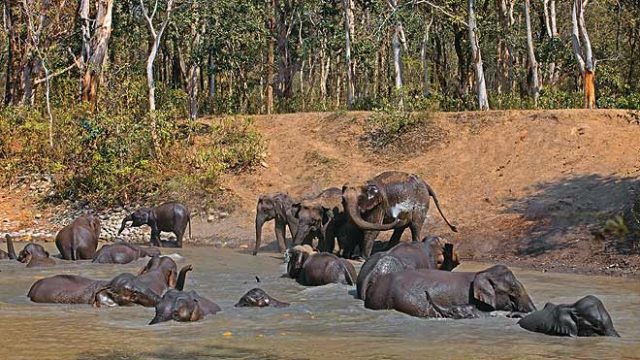Fast facts
State: Uttarakhand
Distance: 208 km NE of Delhi
When to go: The park is open from mid- November to mid-June, seven days a week. Best sightings during high summer
Wildlife/ Forest Dept Offices: Director, Rajaji NP, 5/1 Ansari Marg, Dehradun
Telefax: 0135-2621669
Park Range Officer
Tel:01382-266757, Cell: 0992722814
STD code: 01382
Getting there
Air: Nearest airport: Jolly Grant, Dehradun (38 km/3/4 hr).
Rail: Nearest railhead: Haridwar (9 km/ 30 mins)
Road: Route from Delhi Straight route along NH58 to Haridwar via Meerut, Muzaffarnagar and Roorkee; district road to Chilla, the main entrance of Rajaji. Before reaching the main town there is a roundabout where you take a right across the Ganga to reach the gate at Chilla.
There are two ways to approach a wildlife reserve, those embattled outposts of wilderness in this country. You can think that the animals there are at your beck and call, or you can revel in the experience of being in a world where cars are alien and every animal sighting a blessing. If you belong to the first group, Rajaji National Park isn’t for you. But if you belong to the second group, then you’ll love this park, which is famous for its elephants.
Of course, sightings are unexpected, and since these are gigantic beasts, there is always an element of panic when they suddenly emerge on the path. The animal makes its own way through the dense forest that breaks only when you cross a riverbed. There is a large tusker population in this park, a fact seconded by the research conducted by the Wildlife Institute of India.
But even if you miss a glimpse of the elephant, the forest will ensure that your journey is more than worthwhile. There is abundant birdlife at Rajaji, and their numbers are especially large in the monsoons, when the rivers are full, and in winter, when the migrants arrive. On the ground too, many animals roam the forest. You might see a jackal with his rear in a puddle of rainwater in the middle of the road, or a lapwing couple harrying a pair of Indian monitors hunting for eggs. These creatures may be smaller than the king of this jungle, but they are no less beautiful.
Park Entry Indians INR 150; INR 600 Vehicle Entry Indians INR 250; Foreigners INR 500 Timings 15 November-15 June: 6.00-11.00am & 2.30-5.30pm Jeep Rental INR 1,250 Guide INR 200
Check the rates before you visit, as these are subject to change. The ticket to the park is valid for one day only
Things to see and do
Rajaji NP is situated in the foothills of the Shivalik Range. Most of the land is covered in sal forests. The park has three components: Rajaji, founded in 1948; Motichur, founded in 1936; and Chilla, founded in 1977. Together they spread over 820 sq km and were named Rajaji NP in 1983. A significant part of the Haridwar Range Reserve Forest runs contiguously with Chilla’s southern and south-eastern boundaries.
There are conservation problems in Rajaji, some of which have been attributed to the human population in the park. Gujjars (a shepherd community) settled in the sanctuary over 200 years ago, and their population has increased over time. Their livestock grazed in the park, and the vegetation depleted. Most of the villagers have now been resettled, and conservationists have noted that there are now more signs of wild animals.
Rajaji’s relative quietness ensures a pleasant visit. A jeep safari is the most exciting way to see the park.
Jeep Safaris
You will cover maximum ground on a safari. Each vehicle entering the park, whether private or not, has to be accompanied by a guide. Check with your hotel for the fee. It’s best to rent jeeps from the park gate.
Birding
A number of birds can be found in the park, such as chestnut-headed bee-eaters, pied hornbills, yellow and pied wagtails, rollers, kingfishers, flycatchers and storks. Winter is especially rewarding as it brings a host of migrant birds to Rajaji.
Chandi Devi Mandir
This temple, atop Neel Parvat (on the Haridwar side), is about one kilometre ahead of the entry gate. The chair car goes up to the mandir, and the ride is delightful. From the top, you get an excellent view of Haridwar.
Where to stay and eat
There is a GMVN Tourist Rest House (Tel: 01382-266678-97, Cell: 09568006649 Tariff: INR 2,350-7,600), close to the main gate at Chilla. It’s clean and good value for money.
The Elephant Walk Jungle Lodge and Farm Resort (Tel: 0135-2632800; Cell: 09259693633; Tariff: INR 8,000 with meals), is located in a huge orchard on the periphery of the park. There is a freshwater infinity pool, a basketball court, and a fish pond for anglers. All the cottages have pool and orchard views. The resort arranges jeep rides, birding, and night safaris as well as bonfires and barbecues.
The Wild Brook Retreat (Cell: 09314880887, 08107002924; Tariff: `2,990 per person, with meals) is quite far from the park, set on a site overlooking a river.
The Forest Rest Houses inside the park all have amazing locations, so wildlifers who don’t mind roughing it will find these attractive and cheap. Plan on organizing your own food though, and book well in advance. Enquiries on availability and rates can be addressed to the director of the Rajaji NP. The one at Motichur (Telefax: 0135-2621669; Tariff: Indians INR 1,000-3,000) is basic but good. Note that you will have to carry your own provisions.




